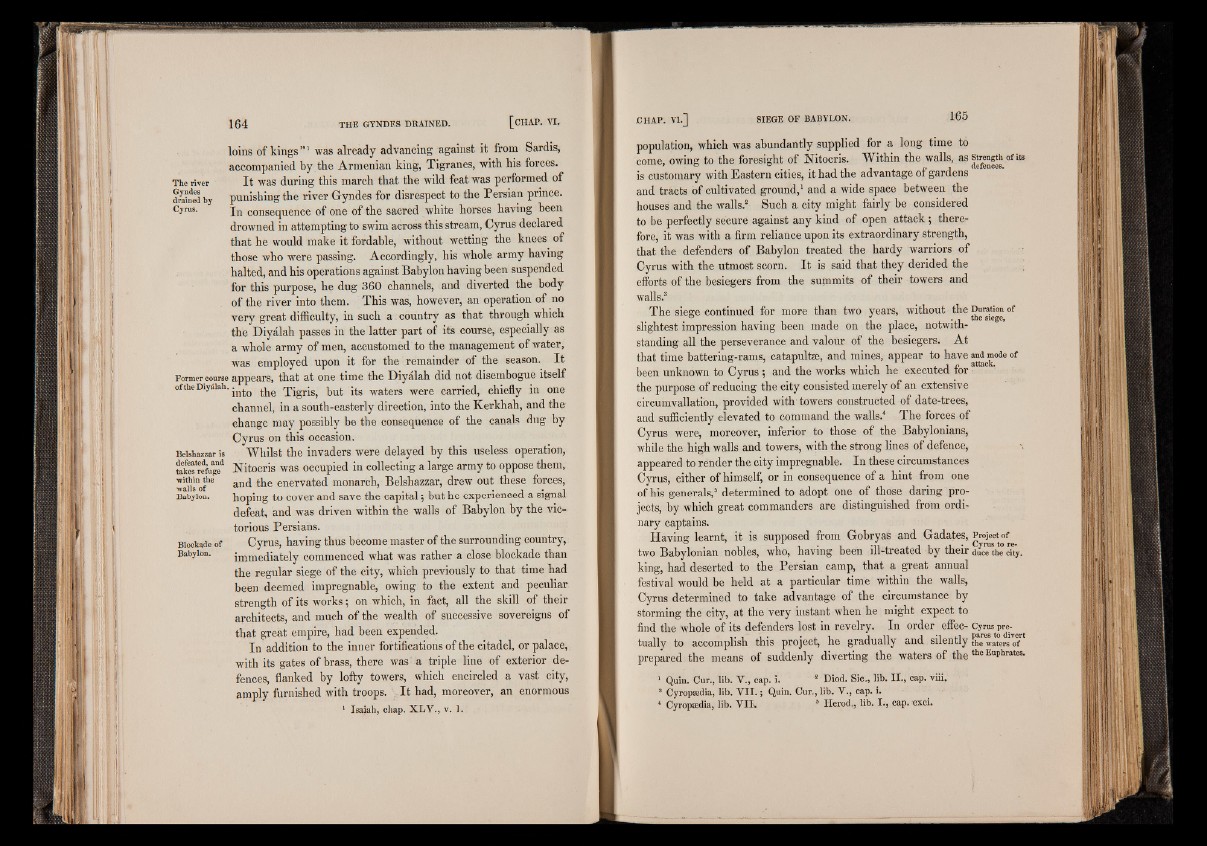
loins of kings’" was already advancing against it from Sardis,
accompanied by the Armenian king, Tigranes, with his forces.
The river It was during this march that the wild feat was performed of
drai^S by punishing the river Gyndes for disrespect to the Persian prince.
Cyras. j n consequence of one of the sacred white horses having been
drowned in attempting to swim across this stream, Cyrus declared
that he would make it fordable, without wetting the knees of
those who were passing. Accordingly, his whole army having
halted, and his operations against Babylon having been suspended
for this purpose, he dug 360 channels, and diverted the body
of the river into them. This was, however, an operation of no
very great difficulty, in such a country as that through which
the Diyalah passes in the latter part of its course, especially as
a whole army of men, accustomed to the management of water,
was employed upon it for the remainder of the season. It
Former course appears, that at one time the Diyalah did not disembogue itself
of the Diyalah. Tigris, but its waters were carried, chiefly in one
channel, in a south-easterly direction, into the Kerkhah, and the
change may possibly be the consequence of the canals dug by
Cyrus on this occasion.
Belshazzar is Whilst the invaders were delayed by this useless operation,
teWefaged Nitocris was occupied in collecting a large army to oppose them,
lhe and the enervated monarch, Belshazzar, 'walls oi « i i i d rew out thesje fo•r ces,l
Babylon. hoping to cover and save the capital; but he experienced a signal
defeat, and was driven within the walls of Babylon by the victorious
Persians.
Blockade of Cyrus, having thus become master of the surrounding country,
Babylon. immediately commenced what was rather a close blockade than
the regular siege of the city, which previously to that time had
been deemed impregnable, owing to the extent and peculiar
strength of its works; on which, in fact, all the skill of their
architects, and much of the wealth of successive sovereigns of
that great empire, had been expended-
In addition to the inner fortifications of the citadel, or palace,
with its gates of brass, there was ’ a triple line of exterior defences,
flanked by lofty towers, which encircled a vast city,
amply furnished with troops. It had, moreover, an enormous
1 Isaiah, chap. X LV ., v. 1.
population, which was abundantly supplied for a long time to
come, owing to the foresight of Nitocris. Within the w a l l s , as strength of its
is customary with Eastern cities, it had the advantage of gardens
and tracts of cultivated ground,1 and a wide space between the
houses and the walls.2 Such a city might fairly be considered
to be perfectly secure against any kind of open attack; therefore,
it was with a firm reliance upon its extraordinary strength,
that the defenders of Babylon treated the hardy warriors of
Cyrus with the utmost scorn. It is said that they derided the
efforts of the besiegers from the sujnmits of their towers and
walls.3
The siege continued for more than two years, without the Duration of
slightest i• mpressi• on havi• ng been madi e on tihe t pl ace, noltw itn- siege,
standing all the perseverance and valour of the besiegers. At
that time battering-rams, catapult®, and mines, appear to have“ d“oie of
been unknown to Cyrus; and the works which he executed for:
the purpose of reducing the city consisted merely of an extensive
circumvallation, provided with towers constructed of date-trees,
and sufficiently elevated to command the walls.4 The forces of
Cyrus were, moreover, inferior to those of the Babylonians,
while the high walls and towers, with the strong lines of defence,
appeared to render the city impregnable. In these circumstances
Cyrus, either of himself, or in consequence of a hint from one
of his generals,5 determined to adopt one of those daring projects,
by which great commanders are distinguished from ordinary
captains.
Having learnt, it is supposed from Gobryas and Gadates, Project of
two Babylonian nobles, who, having been ill-treated by their duee the city,
king, had deserted to the Persian camp, that a great annual
festival would be held at a particular time within the walls,
Cyrus determined to take advantage of the circumstance by
storming the city, at the very instant when he might expect to
find the whole of its defenders lost in revelry. In order effec- Cyrus pre-
tually to accomplish this project, he gradually and silently [he waters of
prepared the means of suddenly diverting the waters of thethe E uPhrates-
1 Quin. Cur., lib. V., cap. i. a Diod. Sic., lib. I I ., cap. viii.
3 Cyropaedia, lib. V I I . ; Quin. Cur., lib. V., cap. i.
4 Cyropasdia, lib. V I I . 5 Herod., lib. I ., cap. cxci.